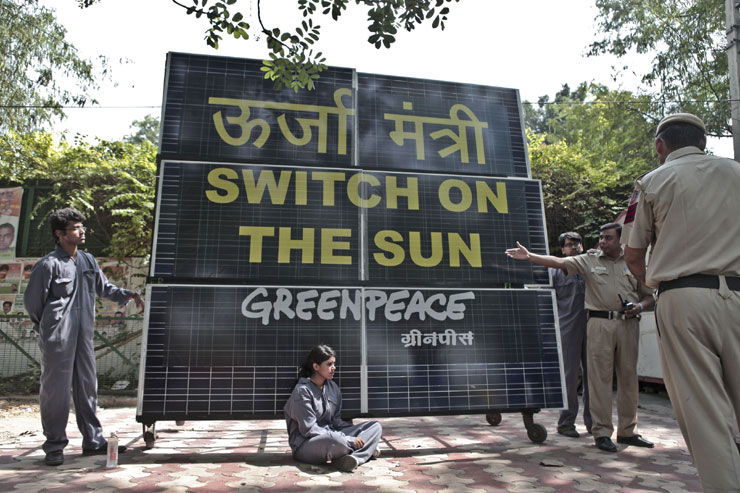Greenpeace Activists Take Solar Power To Delhi Power Minister Haroon Yusuf
By Green Peace India
18 May, 2013
Countercurrents.org

Delhi’s Power Minister Haroon Yusuf was in for a shock on the morning of May 15 when Greenpeace activists decided to deliver a powerful message to him. To make their point that clean energy can solve Delhi’s energy deficit, they wheeled in a set of solar panels in front of the Minister’s residence and then chained themselves to it.
The activists were protesting against Delhi's dull performance on its renewable energy targets as highlighted in the Greenpeace report, ‘Powering Ahead with Renewables: Leaders and Laggards’. (http://www.greenpeace.org/india/en/Press/Publications/Powering-Ahead-on-Renewables/) Over 75% of Delhi’s electricity comes from coal-fired power plants from other states. During the biggest blackout in India’s history in 2012, Delhi was severely affected and came to a standstill for two days. If decentralised renewable energy like solar power was available, Delhi could have powered itself to a large extent during the grid failure.
Soon after the activists positioned themselves right outside the Ministers gate, police forces told them to leave but their persistent demands ensured a meeting with the Minister. He did not commit on a timeline for a strong policy on renewable energy in Delhi. However, he did agree to forward the Greenpeace report and recommendations to the Delhi Electricity Regulatory Commission (DERC) for future action.
The solar panels displayed a message urging the power minister to "Switch on the Sun". But that was not their only use. The 2.3 KW panels can light up Power Minister Haroon Yusuf home meeting most of its energy needs. The activists handed over the solar panels to the Minister to emphasise that he should look at using solar energy to power Delhi’s homes and commercial establishments by installing them on rooftops. The Minister reluctantly accepted the solar panels from the activists after the meeting.
Anand Prabhu Pathanjali, Energy Campaigner at Greenpeace India says, “The Power Minister has no plans to deal with the electricity crisis. Despite holding the power portfolio, he has hardly enunciated on how he intends to deal with the gap in demand and supply of electricity in the Capital. In our report we have highlighted how Delhi has completely ignored its renewable energy targets under the RPO (Renewable Purchase Obligation) mechanism. Meeting renewable target could have staved off the power-cuts that residents in various colonies in Delhi are facing."
The Greenpeace report measures the performance of all states on their renewable energy targets under the RPO. The RPO, Introduced by the Central Electricity Regulatory Commission, guides state electricity regulatory bodies to set targets on renewable energy supply in their energy mix. However, compliance under RPO is not mandatory. So only seven out of 29 states have met their targets. Delhi achieved only 0.01% of its 3.4% target showing a serious lack of political will.
Pathanjali adds, "Greenpeace believes that renewable energy is the key to energy independence and access to quality electricity supply in all the areas of Delhi. The government should earnestly take steps to improve its performance on the use of renewable energy in the national capital to deal with the increasing demand and uncertain supply from conventional sources.”
This summer the Delhi government can make history. It can face the energy crisis and power deficit in Delhi by initiating strong fiscal and policy measures to promote renewable energy. If Delhi implements a strong renewable energy policy it will benefit the entire country, not to mention the people of Delhi. It can also set a positive example to the 22 other states who did not meet their RPO targets. You can also urge the Delhi government to go Renewable. Visit, http://www.greenpeace.org/india/en/What-We-Do/Energy-Revolution/Delhi-can-switch-on-the-sun/No-power-cuts-for-Delhi/
Comments are moderated


